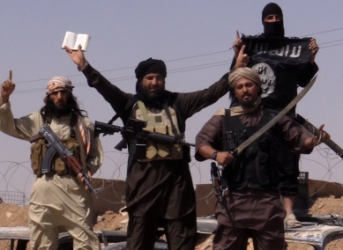There is serious concern that the battle for control of Syria by the group calling itself the Islamic State may soon shift from the mountainous region where the fight for the border town of Kobani continues, as fresh troops from Iraqi Kurdistan known as Peshmergas, arrived via Turkey to assist their fellow Kurds in what is turning out to be one of the most vital battles of this war.
The battle of Kobani, while still unresolved, has nevertheless had a desired effect of sorts: to keep units of the IS tied down in a battle of attrition. Which is perhaps why the group, who thus far have been tactically mobile on the battlefield, may decide to go for the next step: control of an outlet to the Mediterranean Sea.
Access to the sea is absolutely crucial to the group’s survival as an oil and gas producing state. The terrorist group would need to have control of a port from where they could deliver oil and natural gas to tankers and then on to international markets.
Related: Kurds Are The Last Line Of Defense For The West In Kobani
Troops loyal to Syrian president Bashar Assad are expecting the worst, believing that such an attack is imminent and Syrian special forces have deployed across a pinnacle of hills just northeast of Latakia, the country’s principal port. The front line near Latakia is already considered one of Syria's most dangerous frontlines.
In recent weeks there have been repeated missile attacks from Islamist forces around Latakia. Access to, and control of the port is of primary importance for two reasons: First, it would grant the Islamic State its greatest territorial victory to date. From a public relations perspective this would prove to potential recruits and financial supporters of theIS who remain hesitant to get off the fence that the group has the strategic wherewithal to continue operations for some time to come.
Second, the loss of Latakia for the Assad regime could be a death blow to the president and forces loyal to him given that the Latakia region is the home of the president and that tens of thousands of Syrians from all over the country have flocked there when their homes turned into frontlines. Forcing Assad out of power in itself is not a negative outcome, however, having the IS win such a prize would be disastrous for the region and beyond.
Additionally, an assault on the Latakia region would be catastrophic on the humanitarian level, as it would send a tsunami of refugees scurrying for a new safe haven. With a secure access to the sea, the Islamic State would find itself in an even stronger financial position.
Meanwhile, it is worth noting that IS represents a real and present danger to the security of civilization: both Eastern and Western civilization. Dialogue is next to impossible with an organization capable of such cruelty and barbarous savagery. They have enslaved women and girls taken from villages and towns they have conquered, selling them for $10 in the town marketplace.
While every civilized society tries to protect and safeguard their children, the IS, in yet another video, shows young boys receiving military training on how to carry out urban warfare.
Related: World War III: It's Here And Energy Is Largely Behind It
Several years ago while being interviewed on a Washington, DC news radio station I was asked by the news anchor if I thought there would one day be peace in the Middle East and what would it take to reach that point, and that I had 30 seconds for my answer before he had to take a commercial break.
I replied that yes, I did think there would be peace in the Middle East but only when the antagonists develop greater love for their children than hate for their enemies.
With that in mind, it would appear that peace in the Middle East is still a long way off. As it currently stands there is far too much hatred among the current antagonists to contemplate any serious peace efforts.
By Claude Salhani of Oilprice.com
More Top Reads From Oilprice.com:
- How Safe Are Turkey’s Oil And Gas Pipelines?
- Kurds Are “Fighting For America” Against Islamic State
- Islamic State Battles Kurds Over Border Town To Maintain Oil Trade


















